小学一般过去时详细讲解与练习
(完整)小学英语一般过去时专项讲解、练习和参考答案
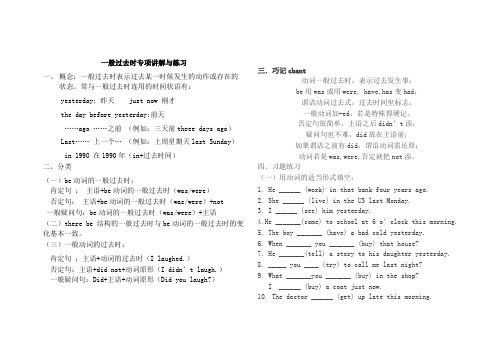
一般过去时专项讲解与练习一、概念:一般过去时表示过去某一时候发生的动作或存在的状态。
常与一般过去时连用的时间状语有:yesterday; 昨天 just now 刚才the day before yesterday;前天……ago ……之前(例如:三天前three days ago)Last…… 上一个… (例如:上周星期天last Sunday)in 1990 在1990年(in+过去时间)二、分类(一)be动词的一般过去时:肯定句:主语+be动词的一般过去时(was/were)否定句:主语+be动词的一般过去时(was/were)+not一般疑问句:be动词的一般过去时(was/were)+主语(二)there be 结构的一般过去时与be动词的一般过去时的变化基本一致。
(三)一般动词的过去时:肯定句:主语+动词的过去时(I laughed.)否定句:主语+did not+动词原形(I didn’t laugh.)一般疑问句:Did+主语+动词原形(Did you laugh?)三.巧记chant动词一般过去时,表示过去发生事;be用was或用were, have,has变had;谓语动词过去式,过去时间坐标志;一般动词加-ed,若是特殊得硬记。
否定句很简单,主语之后didn’t添;疑问句也不难,did放在主语前;如果谓语之前有did,谓语动词需还原;动词若是was,were,否定就把not添。
四、习题练习(一)用动词的适当形式填空:1. He ______ (work) in that bank four years ago.2. She ______ (live) in the US last Monday.3. I ______ (see) him yesterday.4.He _______(come) to school at 6 o’clock this morning.5. The boy _______ (have) a bad cold yesterday.6. When _______ you _______ (buy) that house?7. He _______(tell) a story to his daughter yesterday.8. _____ you ____ (try) to call me last night?9. What _______you _______ (buy) in the shop?I ______ (buy) a coat just now.10. The doctor ______ (get) up late this morning.11. She ________ (paint) the wall last month.12. My mother _______ (be) a worker 20 years ago.13. ________ (be) you here just now?No, I ________ (be not) here.14. Why _______ your brother _______ (cry) last night?15. It ______(be) my mother’s birthday yesterday.(二)翻译下列句子:1.我上周去看爷爷和奶奶了。
小学英语一般过去时讲解及练习

小学英语一般现在时讲解及练习一、概念:表示在过去某个时间里所发生的动作或存在的状态。
通常在句子里找到表示过去时间的词或词组。
如:yesterday,yesterday morning/ evening,the day before yesterday(前天),last night/week/ month/year,just now(刚才),two days ago,a week ago,in 1990等。
如:I went to bed at eleven last night. 昨晚我11:00睡觉。
二、动词一般过去时变化规则1.一般在动词末尾加-ed,如:pull-pulled, cook-cooked, play- played2.结尾是e加d,如:taste-tasted3.末尾只有一个元音字母和一个辅音字母的重读闭音节,应双写末尾的辅音字母,再加-ed,如:stop-stopped,plan-planned, prefer-preferred4.以“辅音字母+y”结尾的,变y为i,再加-ed,如:study-studied 5.小学阶段不规则动词一般过去时:am/is→was are→were have/has→had do→didsing→sang sit→sat give→gave run→rancome→came eat→atetake→took write→wrote ride→ rode drive→drove speak→spoke get→gotgo→went make→made know→knew see→sawteach→taught buy→boughtread→read pu t→put hurt→hurt cut→cutfall→fell say→said三、句式变化(1) Be动词在一般过去时中的变化① am 和is在一般过去时中变为was。
(was not=wasn’t)② are在一般过去时中变为were。
(完整版)小学地理一般过去时讲解及练习
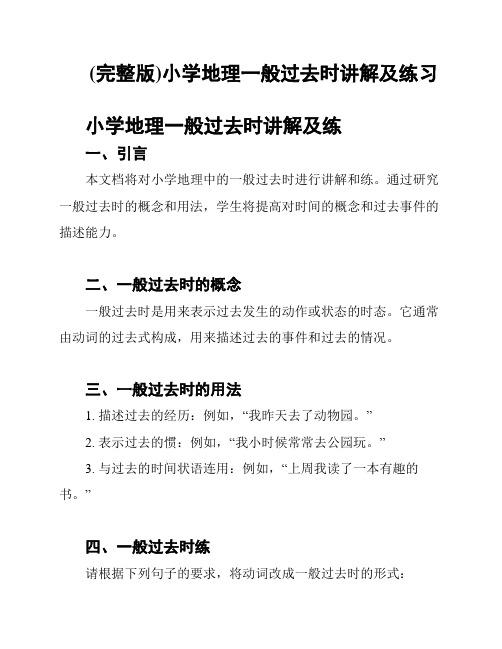
(完整版)小学地理一般过去时讲解及练习
小学地理一般过去时讲解及练
一、引言
本文档将对小学地理中的一般过去时进行讲解和练。
通过研究一般过去时的概念和用法,学生将提高对时间的概念和过去事件的描述能力。
二、一般过去时的概念
一般过去时是用来表示过去发生的动作或状态的时态。
它通常由动词的过去式构成,用来描述过去的事件和过去的情况。
三、一般过去时的用法
1. 描述过去的经历:例如,“我昨天去了动物园。
”
2. 表示过去的惯:例如,“我小时候常常去公园玩。
”
3. 与过去的时间状语连用:例如,“上周我读了一本有趣的书。
”
四、一般过去时练
请根据下列句子的要求,将动词改成一般过去时的形式:
1. 我们在学校里玩。
改成一般过去时:我们在学校里___(玩)。
2. 昨天我看见了一只小鸟。
改成一般过去时:昨天我___(看见)了一只小鸟。
3. 她经常去公园散步。
改成一般过去时:她常常去公园___(散步)。
4. 我们昨天去了海边游泳。
改成一般过去时:我们昨天___(去)了海边___(游泳)。
5. 上个月我们去了北京旅行。
改成一般过去时:___(上个月)我们___(去)了北京___(旅行)。
五、总结
通过本文档的讲解和练习,学生们应该对一般过去时有了更深入的了解。
通过不断的练习和运用,他们将能够熟练地运用一般过去时来描述过去的事件和情况。
小学音乐一般过去时讲解及练习
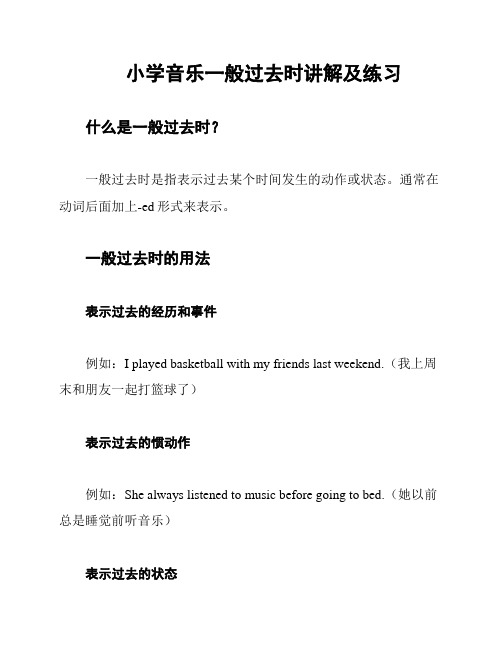
小学音乐一般过去时讲解及练习什么是一般过去时?一般过去时是指表示过去某个时间发生的动作或状态。
通常在动词后面加上-ed形式来表示。
一般过去时的用法表示过去的经历和事件例如:I played basketball with my friends last weekend.(我上周末和朋友一起打篮球了)表示过去的惯动作例如:She always listened to music before going to bed.(她以前总是睡觉前听音乐)表示过去的状态例如:He was happy when he received the gift.(他收到礼物时很开心)一般过去时的构成动词加-ed,如:play - played,walk - walked,live - lived等。
但是也有一些特殊的情况,需要变化的部分可能是辅音字母的双写,或-e的去掉, 或者变为-i然后在加-ed等。
一般过去时的练选择填空2. We ___ (visit/visited) the museum last week.3. She ___ (watched/watch) TV for two hours last night.句型转换1. He ran in the park last Tuesday.(改为一般疑问句)> Did he run in the park last Tuesday?2. They played volleyball in the school gym last weekend.(改为否定句)> They didn't play volleyball in the school gym last weekend.3. She started to study English three years ago.(对划线部分提问)> When did she start to study English?。
小学科学一般过去时专项讲解、练习和参考答案

小学科学一般过去时专项讲解、练习和参考答案1. 专项讲解1.1 什么是一般过去时?一般过去时是英语中表示过去发生的动作、事件或状态的时间形式。
它通常与过去的时间状语连用,例如"yesterday"(昨天)、"last week"(上周)等。
1.2 一般过去时的构成一般过去时的构成有两种情况:1. 对于大部分动词,直接在动词后面加上"-ed"形成过去式,例如:- play(玩)→ played(玩过)- walk(走)→ walked(走过)- jump(跳)→ jumped(跳过)2. 对于以字母"e"结尾的动词,只需在动词后面加上"d"形成过去式,例如:- dance(跳舞)→ danced(跳过舞)- smile(微笑)→ smiled(微笑过)- arrive(到达)→ arrived(到达过)1.3 一般过去时的用法一般过去时用来描述过去发生的动作、事件或状态。
例如:- I played football with my friends yesterday.(昨天我和我的朋友们一起踢足球。
)- She walked to school last week.(上周她走路去学校。
)- We watched a movie together.(我们一起看电影了。
)2. 练2.1 根据所给动词的过去式填空1. I __________ (finish) my homework last night.2. He __________ (visit) his grandparents yesterday.3. They __________ (play) basketball in the park this morning.2.2 根据句意选择适当的动词形式1. My sister __________ (paint / painted) a beautiful picture yesterday.2. We __________ (watch / watched) a movie together last weekend.3. The cat __________ (jump / jumped) off the table.3. 参考答案3.1 专项讲解略3.2 练2.1 答案:1. finished2. visited3. played2.2 答案:1. painted2. watched3. jumped以上是小学科学一般过去时专项讲解、练习和参考答案的完整版。
小学英语一般过去时讲解+练习题+答案
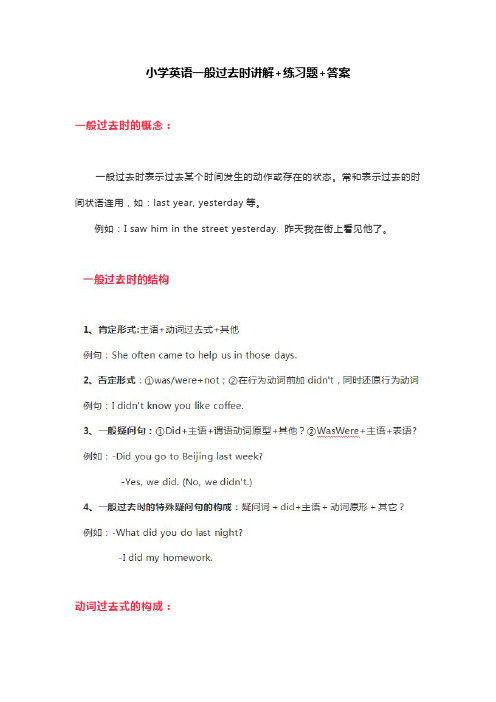
小学英语一般过去时讲解+练习题+答案一般过去时的概念:一般过去时表示过去某个时间发生的动作或存在的状态。
常和表示过去的时间状语连用,如:last year,yesterday等。
例如:I saw him in the street yesterday.昨天我在街上看见他了。
动词过去式的构成:(1)规则动词过去式的构成有四条规则:①一般在动词原形末尾直接加上-ed。
如:look-looked。
②以不发音的字母e结尾的动词,去e再加-ed。
如:live-lived。
③末尾只有一个辅音字母的重读闭音节(辅元辅结构),先双写这个辅音字母,再加-ed。
如:stop-stopped。
④末尾是辅音字母+y结尾的动词,先变y为i,然后再加-ed。
如:study-studied。
(2)不规则动词的过去式需特殊记忆。
如:am(is)-was,are-were,go-went, come-came,take-took,have(has)-had等。
最后一条请注意,动词过去式要牢记。
一般过去式专项练习一、改写句子1、Lucy did her homework at home.(改否定句)Lucy_______________her homework at home.2、He found some meat in the fridge(冰箱).(对划线部分提问) ______________________he__________in the fridge?3、There was some orange in the cup.(变一般疑问句)_______there_______orange in the cup?4.Frank read an interesting book about history.(一般疑问句)_______Frank_______an interesting book about history?参考答案、1.didn't do2.What;did;find3.Was;any4.Did;read二、句型转换They read English last night.一般疑问句:________________________________________肯定/否定回答:____________________________________对划线部分提问:____________________________________参考答案“Did they read English last night?Yes,they did./No,they didn't.What did they do last night?三、用所给动词的适当形式填空1.Tom and Mary___________(come)to china last month.2.Mike_________________(not go)to bed until12o’clock last night.so I_______ (get)up late.3.Mary__________(read)english yesterday morning.4.There_________(be)no one here a moment ago.5.I___________(call)mike this morning.6.I listened but___________(hear)nothing.7.Tom___________(begin)to learn chinese last year.st week we_________(pick)many apples on the farm.9.My mother________________(not do)housework yesterday.10.She watches TV every evening.But she_______________(not watch)TV last night.11.________your father________(go)to work every day last year?12.—What time_______you_______(get)to beijing yesterday?—We__________(get)to beijing at9:00in the evening.13.What__________(make)him cry(哭)just now?st year the teacher___________(tell)us that the earth moves around the sun.参考答案1.came2.didn’t go got3.read4.was5.called6.heard7.began8.picked9.didn’t do10.didn’t watch11.Did go12.did get got13.made14.told。
一般过去时讲解与练习小学生

一般过去时讲解与练习1.一般过去时表示过去某个时间发生的动作或存在的状态,常和表示过去的时间状语连用。
一般过去时也表示过去经常或反复发生的动作。
2.Be动词在一般过去时中的变化:⑴am 和is在一般过去时中变为was。
(was not=wasn’t)⑵are在一般过去时中变为were。
(were not=weren't)⑶带有was或were的句子,其否定、疑问的变化和is,am, are一样,即否定句在was或were后加not,一般疑问句把was或were 调到句首.3.句中没有be动词的一般过去时的句子否定句:didn’t +动词原形,如:Jim didn’t go home yesterday.一般疑问句:在句首加did,句子中的动词过去式变回原形。
如:Did Jim go home yesterday?特殊疑问句:⑴疑问词+did+主语+动词原形?如:What did Jim do yesterday?⑵疑问词当主语时:疑问词+动词过去式?如:Who went to home yesterday?动词过去式变化规则:1.一般在动词末尾加-ed,如:play—played,cook—cooked 2.结尾是e加d,如:taste-tasted3.末尾只有一个元音字母和一个辅音字母的重读闭音节,应双写末尾的辅音字母,再加—ed,如:stop-stopped4.以“辅音字母+y”结尾的,变y为i,再加—ed,如:study-studied 5.小学常用不规则动词过去式:am,is-was, are-were, do-did, see-saw,say—said,give-gave,get—got,go-went, come-came, have—had,eat-ate,take—took, run—ran, sing—sang, put—put, make—made,read—read, write—wrote,draw-drew, drink—drank, fly-flew,ride-rode,speak—spoke,sweep-swept,swim—swam,sit-sat一.用be动词的适当形式填空1。
小学英语一般过去时专项讲解、练习和参考答案
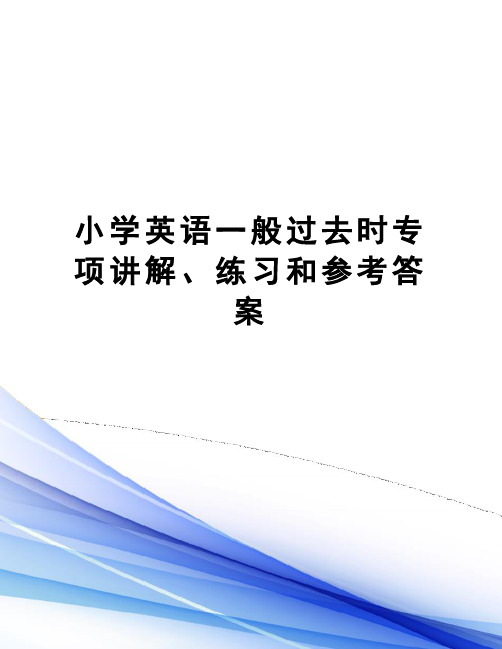
小学英语一般过去时专项讲解、练习和参考答案一般过去时专项讲解与练习一、概念:一般过去时表示过去某一时候发生的动作或存在的状态。
常与一般过去时连用的时间状语有:yesterday; 昨天just now刚才the day before yesterday;前天⋯⋯ago ⋯⋯之前(例如:三天前 three days ago )Last ⋯⋯上一个⋯(例如:上周星期天last Sunday )in 1990在1990年(in+过去时间)二、分类(一) be 动词的一般过去时:肯定句:主语 +be 动词的一般过去时( was/were)否定句:主语+be动词的一般过去时(was/were)+not一般疑问句: be 动词的一般过去时( was/were )+主语(二) there be结构的一般过去时与be 动词的一般过去时的变化基本一致。
(三)一般动词的过去时:肯定句:主语 +动词的过去时( I laughed.)否定句:主语 +did not+ 动词原形( I didn’t laugh.)一般疑问句: Did+主语 +动词原形( Did you laugh?)三.巧记 chant动词一般过去时,表示过去发生事;be 用 was 或用 were, have,has变had;谓语动词过去式,过去时间坐标志;一般动词加 -ed ,若是特殊得硬记。
否定句很简单,主语之后didn ’ t 添;疑问句也不难, did 放在主语前;如果谓语之前有 did ,谓语动词需还原;动词若是 was,were, 否定就把 not 添。
四、习题练习(一)用动词的适当形式填空:1.He ______ (work) in that bank four years ago.2.She ______ (live) in the US last Monday.3.I ______ (see) him yesterday.4.He _______(come) to school at 6 o’clock this morning.5.The boy _______ (have) a bad cold yesterday.6.When _______ you _______ (buy) that house?7.He _______(tell) a story to his daughter yesterday.8._____ you ____ (try) to call me last night?9.What _______you _______ (buy) in the shop?I ______ (buy) a coat just now.10. The doctor ______ (get) up late this morning.11.She ________ (paint) the wall last month.12.My mother _______ (be) a worker 20 years ago.13.________ (be) you here just now?No, I ________ (be not) here.14.Why _______ your brother _______ (cry) last night?15.It ______(be) my mother’s birthday yesterday.(二)翻译下列句子:1.我上周去看爷爷和奶奶了。
- 1、下载文档前请自行甄别文档内容的完整性,平台不提供额外的编辑、内容补充、找答案等附加服务。
- 2、"仅部分预览"的文档,不可在线预览部分如存在完整性等问题,可反馈申请退款(可完整预览的文档不适用该条件!)。
- 3、如文档侵犯您的权益,请联系客服反馈,我们会尽快为您处理(人工客服工作时间:9:00-18:30)。
一般过去时详细讲解与练习题一、巧记一般过去时:动词一般过去时,表示过去发生的事;be 用was 或用were, have,has 变had ;谓语动词过去式,过去时间作标志;一般动词加-ed ,若是特殊得硬记。
否定句很简单,主语之后didn’t 添;疑问句也不难,did 放在主语前;不含be 动词时如果谓语之前有did ,谓语动词需还原;动词若是was,were,否定就把not 添。
含be 动词时疑问句也不难,要把was ,were 放在主语前。
二、be 的一般过去时:学习动词be 的一般过去时,下面有一口诀,它可以帮你们更好地掌握动词be 的一般过去时。
be 的过去时有四巧:一是时间状语巧, 表示过去的短语要记牢;二是形式巧,单数was ,复数were ;三巧是否定句结构,not 紧跟was /were ;四是疑问句式巧,was /were 向前跑(提前)。
【一巧】时间状语(即标志词)巧。
一般过去时表示过去发生的动作或存在的状态,恰巧与表示过去的一些时间状语连用。
例如: I was in the classroom yesterday morning . 昨天早上我在教室里。
He was at school last Tuesday . 上周二他在学校。
They were over there a moment ago . 刚才他们在那边。
【三巧】否定句结构巧。
与动词be 的一般现在时一样,它在动词后面加not 即可变成否定句,并且was, were 与not 可以缩写成wasn't, weren't 。
即:主语 + wasn't / weren't + 表语 + 其他。
例如:I was not (=wasn't) here yesterday . 昨天我不在这儿。
My parents were not (=weren't) at home last Sunday . 上周日我父母不在家。
【四巧】 疑问句式巧。
把was, were 提到句首,句末用问号即可变为一般疑问句。
即:Was(Were) + 主语 +表语 + 其他?这恰巧与动词be 的一般现在时的疑问句式相似。
例如: Were you at home the day before yesterday ﹖ 前天你在家吗?Was she late this morning ﹖今天早上她迟到了吗?更巧的是疑问句的答语也相似,肯定回答用“Yes, 主语+was /were .”;否定回答用“No,主语+wasn't /weren't .”。
例如:—Were Wei Hua and Han Mei here just now ﹖ 刚才魏华和韩梅在这儿吗?—Yes, they were . (No, they weren't .) 是的,她们在。
(不,她们不在。
)一、单项选择: 从下列各题后所给的四个选项中选择最佳答案填空。
(10)( )1. My father ______ill yesterday .A . isn'tB . aren'tC . wasn'tD . weren't( )2. ______your parents at home last week ﹖A . IsB . WasC . AreD . Were( )3. The twins ______in Dalian last year . They ______here now .A . are; wereB . were; areC . was; areD . were; was( )4. ______your father at work the day _____yesterday(前天)﹖A . Was; beforeB . Is; beforeC . Was; afterD . Is; after( )5. —Who was on duty last Friday ﹖—______.A . I amB . I wasC . Yes, I wasD . No, I wasn't( )6. I cleaned my classroom ___________.A with three hoursB three hours agoC in three hoursD three hours before( ) 7. I came _______ my house two days ago .A back onB back toC to backD back( ) 8 . ___________? He did some reading at home.A What does your father do yesterday eveningB What does your brother do in the schoolC What did your brother do over the weekendD Where did your brother go last Sunday( ) 9. What did you do ________ ? I went to the movies.A next morning Bover the weekend C in the weekend D next Monday( ) 10. The koala sleeps _______,but gets up _________.A during the day; at the eveningB at day ;during nightC in the day ;during the eveningD during the day ; at night二、请用正确动词形式填空。
(10)1. I _________ (have) an exciting party last weekend.2. _________ she _________(practice) her guitar yesterday? No, she _________.3. What ________ Tom ________ (do) on Saturday evening?He ________(watch) TV and __________(read) an interesting book.4. They all _________(go) to the mountains yesterday morning.5. She _________(not visit) her aunt last weekend.She ________ (stay) at home and _________(do) some cleaning.6. When ________ you _________(write) this song? I __________(write) it last year.7. My friend, Carol, ________(study) for the math test and ________(practice) English last night.8. ________ Mr. Li __________(do) the project on Monday morning? Yes, he _________.9. How _________(be) Jim's weekend? It _________(be not) bad.10. ________ (be) your mother a sales assistant last year? No. she __________.三、翻译下列句子(20)1. 我过了一个忙碌但却刺激的周末。
I _________ _________ __________ __________ exciting weekend.2. Jenny喜欢看书。
昨晚她看了一本英语书。
Jenny likes _________ __________. She _________ an English book last night.3. Emma每天都看电视。
可是昨天他没有看。
Emma__________ TV every day. But he _________ ________ ________ yesterday.4. 上周六他们做什么了?他们做作业和购物了。
What ________ they _________ _________ Saturday?They _________ __________ homework and _________ __________.5. 今天早上方方得做饭,因为他父亲不在家。
This morning Fangfang ____ ____ ____ ____ because his father _____ _____ ____ yesterday.6. 你还有什么要说的?What _______ would you like _______ _______?7. 放学别忘了向老师说声再见。
Don’t forget ______ _______ _______ _______ the teacher.8. 为什么你昨晚没有看电视?Why _______ you _______ TV last night?9. 他在打扫教室的时候,发现地上有块表。
When he ______ the classroom, he ______ a watch on the ground.10. 他什么时候出生的?1980年。
---When _______ he _______? ---_______ 1980.四、改写句子:(20)1、Lucy did her homework at home.(改否定句)Lucy ________ _______ her homework at home.2、He found some meat in the fridge(冰箱).(变一般疑问句)___________ he __________ ___________ meat in the fridge?3、There was some orange in the cup.(变一般疑问句)_______ there _______ orange in the cup?4. Frank read an interesting book about history. (一般疑问句)_______ Frank _______ an interesting book about history?5. Why not go out for a walk? (同义句)_______ ________ ________ out for a walk?6. Thomas spent RMB 10 on this book. (否定句)Thomas______ _____RMB 10 on this book.7. My family went to the beach last week. (划线提问)________ ________ ________ family _______ last week?8. I think she is Lily’s sister. (否定句。
